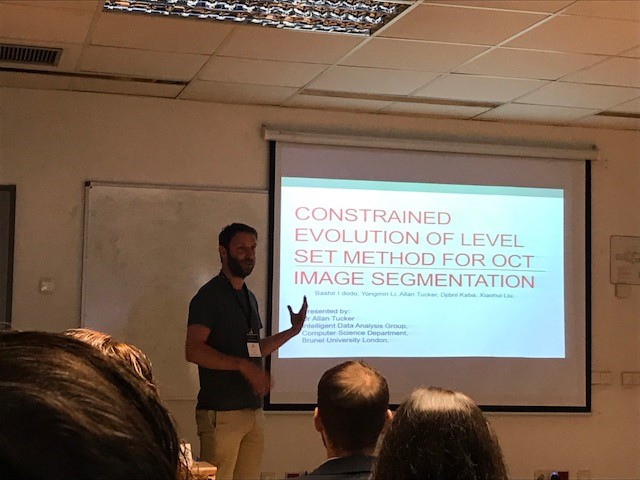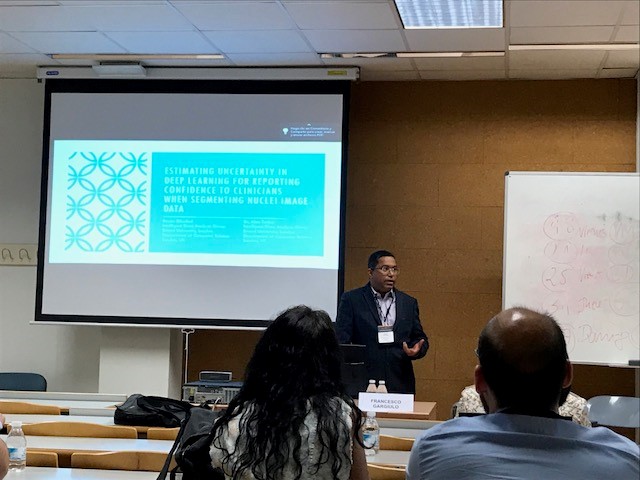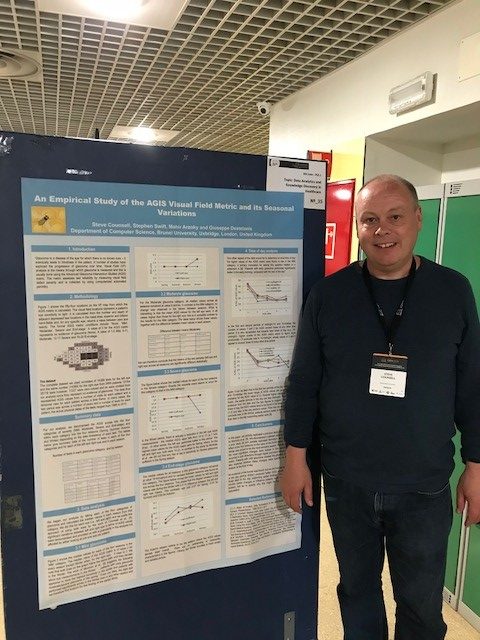Congratulations to Nicky Nicolson who successfully defended her thesis on Friday 5th Oct with no changes! Nicky leads an IDA group at the Royal Botanical Gardens at Kew.
News
IDA Opening the Black Box Seminar (04 Oct 2019)
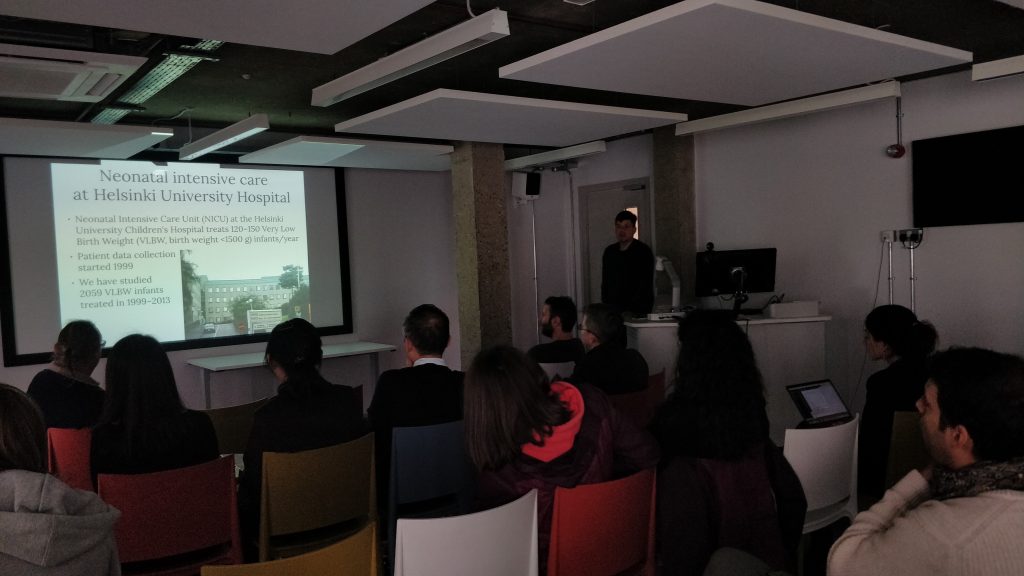
Jaakko Hollmén, Stockholm University, Department of Computer and Systems Sciences, Sweden
Jaakko Hollmén is a faculty member at Department of Computer and Systems Sciences at Stokcholm University in Sweden (since September 2019). Prior to joining Stokcholm university, he was a faculty member at the Department of Computer Science at Aalto University in Finland. His research interests include theory and practice of machine learning and data mining, in particular in the context of health, medicine and environmental sciences. He has been involved in the organization of many IDA conferences for the past ten years. He is also the secretary of the IDA council.
Title of Talk: Diagnostic prediction in neonatal intensive care units
Abstract: Preterm infants, born before 37 weeks of gestation, are subject to many developmental issues and health problems. Very Low Birth Weight (VLBW) infants, with a birth weight under 1500 g, are the most afflicted in this group. These infants require treatment in the neonatal intensive care unit before they are mature enough for hospital discharge. The neonatal intensive care unit is a data-intensive environment, where multi-channel physiological data is gathered from patients using a number of sensors to construct a comprehensive picture of the patients’ vital signs. We have looked into the problem how to predict neonatal in-hospital mortality and morbidities. We have used time series data collected from Very Low Birth Weight infants treated in the neonatal intensive care unit of Helsinki University Hospital between 1999 and 2013. Our results show that machine learning models based on time series data alone have predictive power comparable with standard medical scores, and combining the two results in improved predictive ability. We have also studied the effect of observer bias on recording vital sign measurements in the neonatal intensive care unit, as well as conducted a retrospective cohort study on trends in the growth of Extremely Low Birth Weight (birth weight under 1000 g) infants during intensive care.
Welcome to new PhDs / Interns
Welcome to Ashley Mann, Fawzia Kara-Isitt and Faisal Maramazi who will be starting their PhDs in October supervised by Stephen Swift and Mahir Arzoky.
Also, welcome to four new interns joining the IDA Group for the next 6 months:
Ylenia Rotalinti (Pavia): Working on Modelling Missingness in Primary Care Data
Barbara Draghi (Pavia): Working on Pseudo Time Models & Topological Analysis
Namir Oues (Brunel): Working on Patient Re-Identification in Synthetic Primary Care Data
Juan de Benedetti (Brunel): Working on Longitudinal Modelling of Primary Care Data
Congratulations to Toyah Overton
Congratulations to Toyah Overton who, with her employer Alcis, came second for her story map on identifying refugee tents using deep learning at the ESRI User conference on GIS last month.
IET: Human Motion Analysis for Healthcare Applications – Noureddin Sadawi
Two talks were presented by Dr Noureddin Sadawi on 26/06/2019 at the Human Motion Analysis for Healthcare Applications conference at the Institute of Engineering and Technology.
Talk 1: Rehabilitation Movement Correctness Classification (slides can be found here)
Talk 2: Challenges encountered while developing MIRA (slides can be found here)
IEEE CBMS 2019
Congratulations to all the IDA group presenters at IEEE CBMS! A great effort!
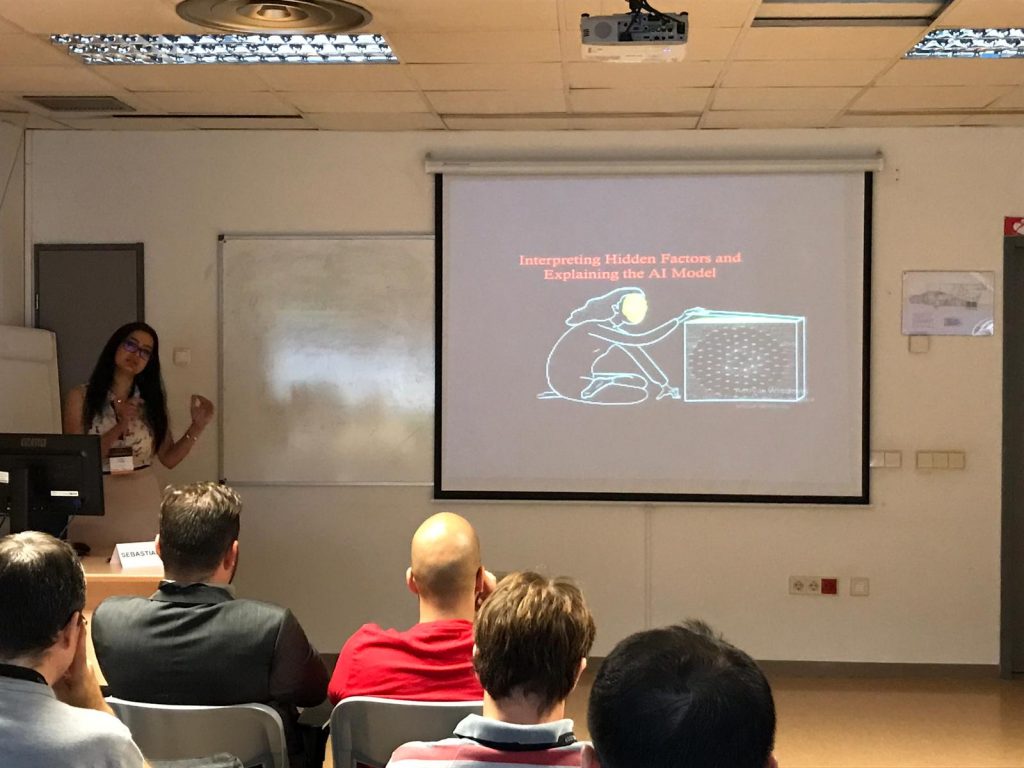
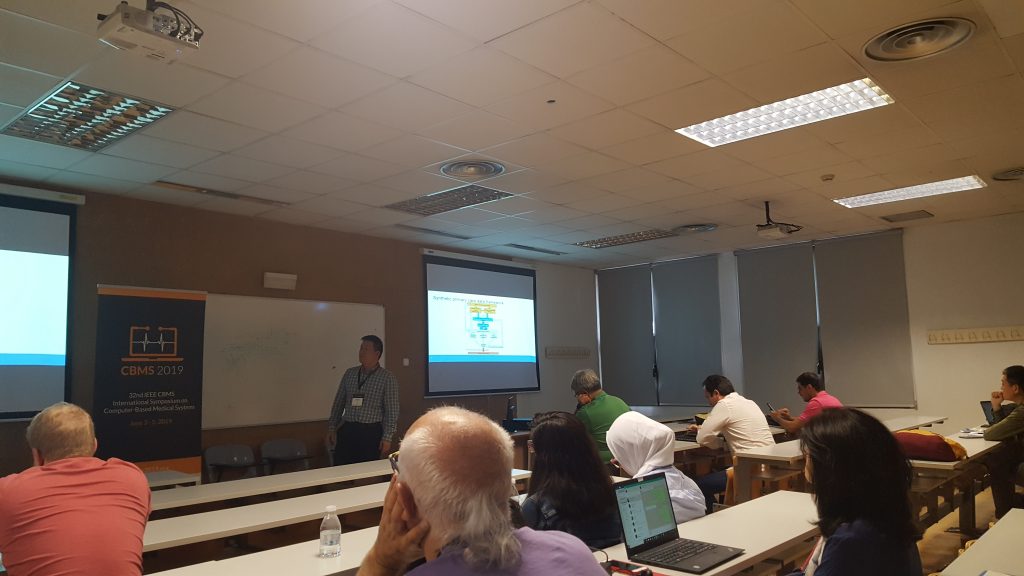
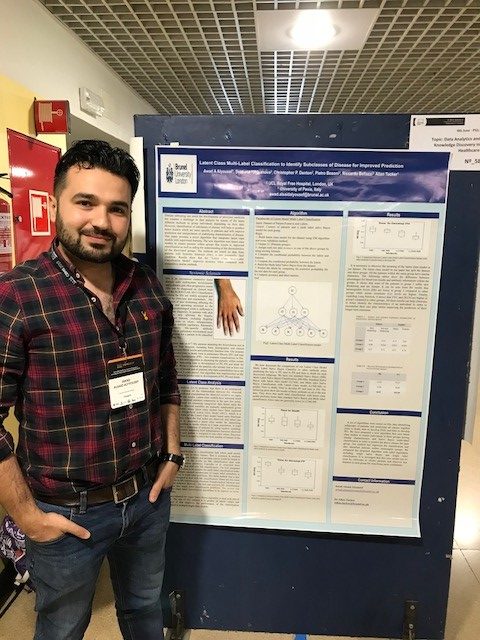
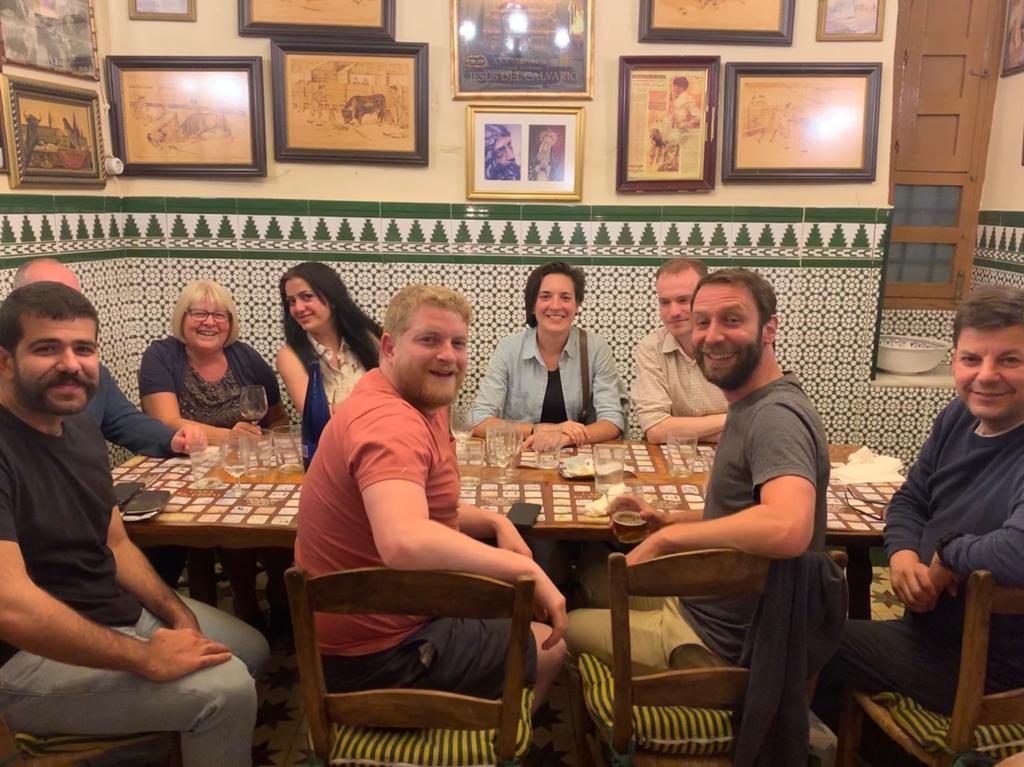
IDA Opening the Black Box Seminar (15 May 2019)
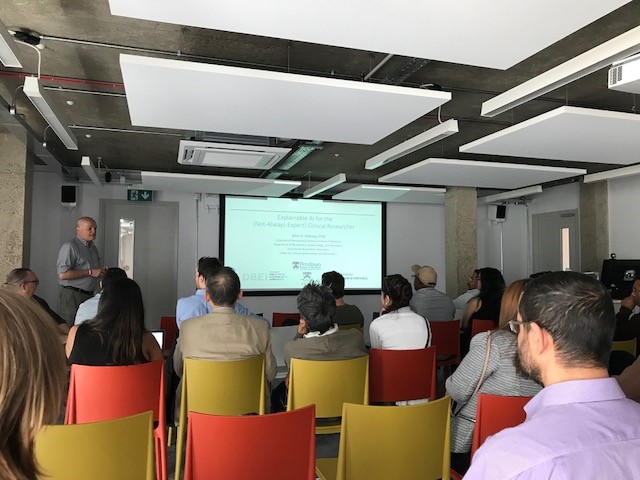
The IDA Opening the Black Box seminar was held from Professor John Holmes titled ‘Explainable AI for the (Not-Always Expert) Clinical Researcher’. It was held at WLFB 207/208 (2nd floor of Wilfred Brown) at 3:00PM. Slides can be found here.
John H. Holmes, PhD, is Professor of Medical Informatics in Epidemiology at the University of Pennsylvania Perelman School of Medicine. He is the Associate Director of the Institute for Biomedical Informatics, Director of the Master’s Program in Biomedical Informatics, and Chair of the Doctoral Program in Epidemiology, all at Penn. Dr. Holmes has been recognized nationally and internationally for his work on developing and applying new approaches to mining epidemiologic surveillance data, as well as his efforts at furthering educational initiatives in clinical research. Dr. Holmes’ research interests are focused on the intersection of medical informatics and clinical research, specifically evolutionary computation and machine learning approaches to knowledge discovery in clinical databases, deep electronic phenotyping, interoperable information systems infrastructures for epidemiologic surveillance, and their application to a broad array of clinical domains, including cardiology and pulmonary medicine. He has collaborated as the informatics lead on an Agency for Healthcare Research and Quality-funded project at Harvard Medical School to establish a scalable distributed research network, and he has served as the co-lead of the Governance Core for the SPAN project, a scalable distributed research network; he participates in the FDA Sentinel Initiative. Dr. Holmes has served as the evaluator for the PCORNet Obesity Initiative studies, where he was responsible for developing and implementing the evaluation plan and metrics for the initiative. Dr. Holmes is or has been a principal or co-investigator on projects funded by the National Cancer Institute, the National Library of Medicine, and the Agency for Healthcare Research and Quality, and he was the Penn principal Investigator of the NIH-funded Penn Center of Excellence in Prostate Cancer Disparities. Dr. Holmes is engaged with the Botswana-UPenn Partnership, assisting in building informatics education and clinical research capacity in Botswana. Dr. Holmes is an elected Fellow of the American College of Medical Informatics (ACMI), the American College of Epidemiology (ACE), and the International Academy of Health Sciences Informatics (IAHSI).
Abstract Armed with a well-founded research question, the clinical researcher’s next step is usually to seek out the data that could help answer it, although the researcher can use data to discover a new research question. In both cases, the data will already be available, and so either approach to inquiry can be appropriate and justifiable. However, the next steps- data preparation, analytics, and inference- are often thorny issues that even the most seasoned researcher must address, and sometimes not so easily. Traditional approaches to data preparation, that include such methods as frequency distribution and contingency table analyses to characterize the data are themselves open to considerable investigator bias. In addition, there is considerable tedium resulting from applying these methods- for example, how many contingency tables does it take to identify variable interactions? It is arguable that feature selection and construction are two tasks not to be left only to human interpretation. Yet we don’t see much in the way of novel approaches to “experiencing” data such that new, data-driven insights arise during the data preparation process. The same can be said for analysis, where even state-of-the art statistical methods, informed or driven by pre-formed hypotheses and the results of feature selection processes, sometimes hampers truly novel knowledge discovery. As a result, inferences made from these analyses likewise suffer. However, new approaches to making AI explainable to users, in this case clinical researchers who do not have the time or inclination to develop a deep understanding of how this or that AI algorithm works, are critically important, and their dearth represents a gap that those of us in clinical research informatics need to fill. Yet, the uninitiated shy away from AI for the very lack of explainability. This talk will explore some new methods for making AI explainable, one of which, PennAI, has been developed at the University of Pennsylvania. PennAI will be demonstrated using several sample datasets.
IDA 2020
IDA 2020
Wondering about the Call for Papers for IDA 2019?
IDA is moving from September to April, (one deadline less this spring!)
IDA 2020 will be held from April 27-29, 2020 in Konstanz, Germany!
You can expect the Call for Papers for IDA 2020 to appear in spring 2019.

Loads of conference paper successes!
Congratulations to:
Mashael Al Luhaybi for her paper “Predicting Academic Performance: A Bootstrapping Approach for Learning Dynamic Bayesian Networks” which has been accepted at AIED 2019
and to the following for their papers being accepted at IEEE CBMS 2019
Biraja Ghoshal for his paper “Estimating Uncertainty in Deep Learning for Reporting Confidence to Clinicians when Segmenting Nuclei Image Data”
Leila Yousefi and Mahir Arzoky for their paper “Opening the Black Box: Exploring Temporal Pattern of Type 2 Diabetes Complications in Patient Clustering Using Association Rules and Hidden Variable Discovery”
Bashir Dodo for his paper “Retinal OCT Segmentation Using Fuzzy Region Competition and Level Set Methods”
Steve Counsell, Stephen Swift, Mahir Arzoky and Giuseppe Destefanis for their poster / short paper “An Empirical Study of the AGIS Visual Field Metric and its Seasonal Variations ”
Awad Al Yousef for his poster / short paper “Latent Class Multi-Label Classification to Identify Subclasses of Disease for Improved Prediction”
Zenchen Wang, Puja Myles and Allan Tucker, “Generating and Evaluating Synthetic UK Primary Care Data: Preserving Data Utility & Patient Privacy”
Other recent conference acceptances:
Arianna Dagliati, Nophar Geifman, Niels Peek, John H. Holmes, Lucia Sacchi, Seyed Erfan Sajjadi, Allan Tucker, “Inferring Temporal Phenotypes with Topological Data Analysis and Pseudo Time-Series” at AIME 2019
and
Fatima Amer Jid Almahri, David Bell and Mahir Arzoky for her paper “Augmented education within a physical space” which has been accepted at UKAIS 2019
Looks like it will be a busy Summer!
EPSRC Scholarships available!
There are EPSRC PhD scholarships currently available for topics including Data Analytics and Artificial Intelligence.
Deadline is 31 May 2019!
More information is here:
